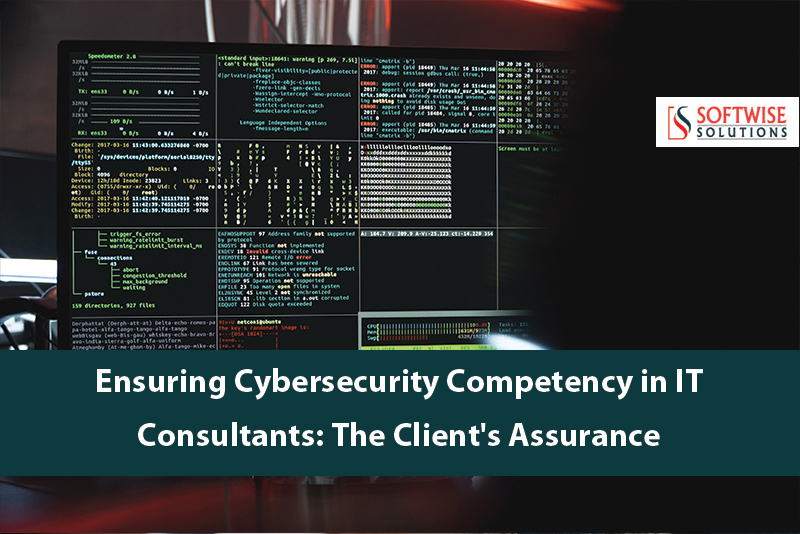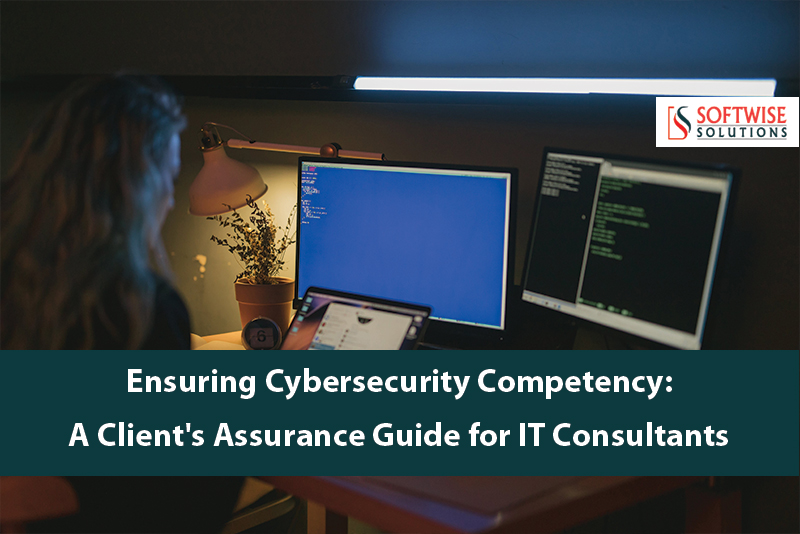In the realm of Information Technology (IT) consultancy, the assurance of cybersecurity competency is not just a checkbox – it's a critical foundation for building trust and safeguarding the digital landscape. As businesses increasingly rely on IT consultants to navigate complex technological landscapes, the need for robust cybersecurity measures becomes paramount. In this detailed blog, we embark on a comprehensive exploration of strategies and considerations to ensure cybersecurity competency in IT consultants, providing clients with the assurance they need in an era of evolving cyber threats.
The Evolving Cyber Threat Landscape- Understanding the Stakes
In a digital age where connectivity is ubiquitous, the stakes of cybersecurity have never been higher. Cyber threats continue to evolve, becoming more sophisticated, targeted, and persistent. Clients entrust IT consultants with not only the success of their projects but also the safeguarding of sensitive data, intellectual property, and the overall integrity of their digital infrastructure.
1. Sophistication of Cyber Attacks:
Cyber attackers employ increasingly sophisticated tactics, techniques, and procedures to infiltrate systems. From ransomware attacks to advanced persistent threats, the landscape demands IT consultants to be vigilant and proactive in mitigating risks.
2. Regulatory Compliance Challenges:
The regulatory landscape surrounding data protection and privacy is ever-evolving. Clients, especially those in highly regulated industries, require IT consultants to navigate complex compliance requirements and ensure that their solutions adhere to legal and industry standards.
3. Heightened Client Expectations:
Clients now expect more than just technical expertise – they demand a proactive approach to cybersecurity. The assurance of a consultant's competency in cybersecurity becomes a key factor in the decision-making process for clients seeking reliable and secure IT solutions.
Building Cybersecurity Competency in IT Consultants - Strategies for Assurance
1. Robust Hiring Practices:
The journey towards cybersecurity competency begins with hiring practices. IT consultancy firms should prioritize hiring professionals with demonstrated expertise in cybersecurity. Conduct thorough background checks, assess relevant certifications, and ensure that cybersecurity proficiency is a non-negotiable criterion during recruitment.
2. Continuous Training and Development:
Cybersecurity is a dynamic field that requires continuous learning. Establish a culture of ongoing training and development within the consultancy. Provide access to the latest cybersecurity resources, encourage certifications, and support attendance at relevant conferences to keep the team abreast of emerging threats and best practices.
3. Cybersecurity Certifications:
Certifications serve as tangible proof of an individual's cybersecurity knowledge and skills. Encourage and support IT consultants in obtaining recognized cybersecurity certifications such as Certified Information Systems Security Professional (CISSP), Certified Ethical Hacker (CEH), or Certified Information Security Manager (CISM). These certifications not only enhance individual skills but also contribute to the consultancy's credibility.
4. Implementation of Security Frameworks:
Adopting established cybersecurity frameworks is a proactive step towards ensuring competency. Frameworks like NIST Cybersecurity Framework, ISO/IEC 27001, or CIS Critical Security Controls provide a structured approach to cybersecurity. Implementing these frameworks ensures that consultants follow industry best practices and adhere to a standardized approach to cybersecurity.
5. Regular Security Audits and Assessments:
A crucial aspect of cybersecurity competency is the ability to assess and mitigate vulnerabilities. Conduct regular security audits and assessments of systems, networks, and applications. This proactive approach identifies potential weaknesses and allows IT consultants to address them before they can be exploited by malicious actors.
6. Incident Response Planning:
Cybersecurity competency extends beyond prevention to effective incident response. Develop and regularly test incident response plans to ensure that IT consultants are well-prepared to handle security incidents. Clients find assurance in knowing that there is a structured and practiced approach to mitigating the impact of potential breaches.
Communicating Cybersecurity Competency to Clients - Transparency and Assurance
1. Clear Documentation of Security Measures:
Transparency is key to client assurance. Clearly document the cybersecurity measures in place, detailing encryption protocols, access controls, and data protection mechanisms. This documentation serves as evidence of the consultancy's commitment to cybersecurity best practices.
2. Client Education and Collaboration:
Educate clients on cybersecurity best practices and collaborate with them to enhance the security posture of shared projects. Establish open lines of communication to discuss security measures, potential risks, and jointly develop strategies to mitigate threats. A collaborative approach builds trust and reinforces the consultant's commitment to cybersecurity.
3. Regular Security Updates and Reporting:
Keep clients informed through regular security updates and reporting. Provide insights into cybersecurity activities, threat intelligence, and any incidents that may have occurred. Transparent communication about cybersecurity efforts demonstrates a proactive commitment to securing client assets.
4. Compliance Documentation:
For clients in regulated industries, provide comprehensive documentation regarding compliance with relevant standards and regulations. This documentation showcases the consultancy's adherence to legal and industry-specific cybersecurity requirements, offering clients the assurance they need for regulatory compliance.
The Role of Technology in Cybersecurity Assurance - Leveraging Tools and Technologies
1. Security Monitoring and Analytics:
Implement robust security monitoring tools and analytics to detect and respond to potential threats in real-time. Proactive monitoring ensures that IT consultants can identify and address security incidents promptly, minimizing the impact on client systems.
2. Endpoint Protection Solutions:
Utilize advanced endpoint protection solutions to secure devices and prevent malware infections. These solutions play a crucial role in safeguarding both consultant and client assets, providing an additional layer of defense against evolving cyber threats.
3. Multi-Factor Authentication (MFA):
Enforce the use of multi-factor authentication for access to critical systems and data. MFA significantly enhances account security by requiring multiple forms of verification, reducing the risk of unauthorized access even in the event of compromised credentials.
4. Encryption Technologies:
Implement strong encryption technologies to protect data both in transit and at rest. Encryption adds an extra layer of security, ensuring that even if unauthorized access occurs, the data remains unreadable without the proper decryption keys.
Conclusion: A Secure Future Through Cybersecurity Competency
In the ever-evolving landscape of IT consultancy, cybersecurity competency is not just a requisite – it's the bedrock of trust, integrity, and resilience. Clients rely on IT consultants not only for technical expertise but also for the assurance that their digital assets are safeguarded against the relentless tide of cyber threats.
Building and communicating cybersecurity competency requires a holistic approach – from hiring practices to ongoing training, transparent communication with clients, and the strategic implementation of security measures and technologies. By embracing this comprehensive strategy, IT consultants can instill confidence in their clients, fortifying the foundation of a secure and resilient digital future. In an era where cybersecurity is non-negotiable, the commitment to competency becomes a beacon of trust in the vast landscape of IT consultancy.










